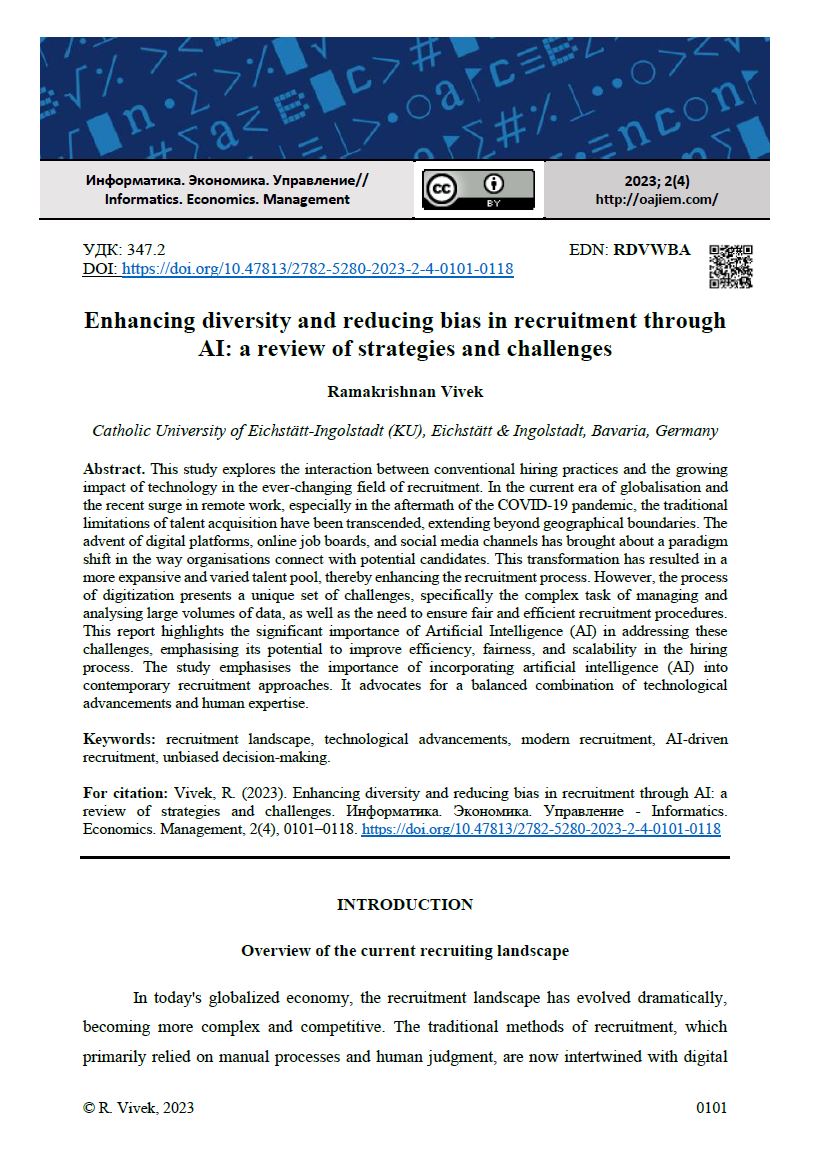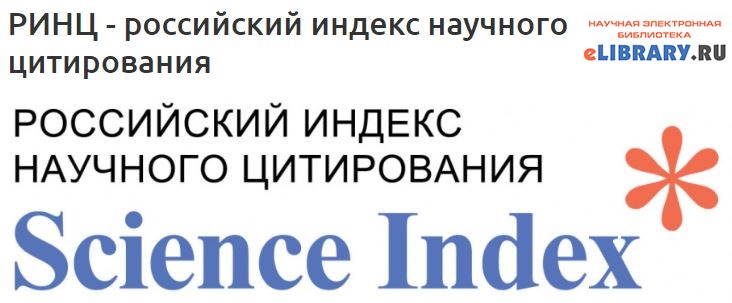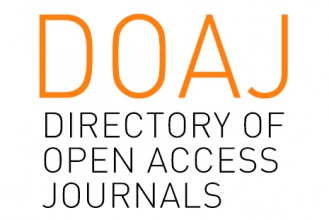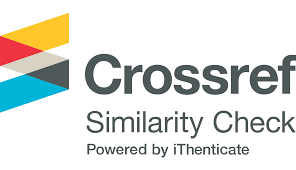Enhancing diversity and reducing bias in recruitment through AI: a review of strategies and challenges
R. Vivek
DOI: https://doi.org/10.47813/2782-5280-2023-2-4-0101-0118
Ключевые слова: recruitment landscape, technological advancements, modern recruitment, AI-driven recruitment, unbiased decision-making.
Аннотация
This study explores the interaction between conventional hiring practices and the growing impact of technology in the ever-changing field of recruitment. In the current era of globalisation and the recent surge in remote work, especially in the aftermath of the COVID-19 pandemic, the traditional limitations of talent acquisition have been transcended, extending beyond geographical boundaries. The advent of digital platforms, online job boards, and social media channels has brought about a paradigm shift in the way organisations connect with potential candidates. This transformation has resulted in a more expansive and varied talent pool, thereby enhancing the recruitment process. However, the process of digitization presents a unique set of challenges, specifically the complex task of managing and analysing large volumes of data, as well as the need to ensure fair and efficient recruitment procedures. This report highlights the significant importance of Artificial Intelligence (AI) in addressing these challenges, emphasising its potential to improve efficiency, fairness, and scalability in the hiring process. The study emphasises the importance of incorporating artificial intelligence (AI) into contemporary recruitment approaches. It advocates for a balanced combination of technological advancements and human expertise.
Биография автора
R. Vivek
Ramakrishnan Vivek, Research Student at Catholic University of Eichstatt-Ingolstadt (KU), Eichstätt & Ingolstadt, Bavaria, Germany
Библиографические ссылки
Cletus, H. E., Mahmood, N. A., Umar, A., & Ibrahim, A. D. Prospects and challenges of workplace diversity in modern day organizations: A critical review. HOLISTICA–Journal of Business and Public Administration. 2018; 9(2): 35-52. https://doi.org/10.2478/hjbpa-2018-0011 DOI: https://doi.org/10.2478/hjbpa-2018-0011
Adeosun, O. T., & Ohiani, A. S. Attracting and recruiting quality talent: firm perspectives. Rajagiri Management Journal. 2020; 14(2): 107-120. https://doi.org/10.1108/RAMJ-05-2020-0016 DOI: https://doi.org/10.1108/RAMJ-05-2020-0016
Mishra, S., & Kumar, S. P. E-recruitment and training comprehensiveness: untapped antecedents of employer branding. Industrial and commercial training. 2023; 51(2): 125-136. https://doi.org/10.1108/ICT-12-2017-0106 DOI: https://doi.org/10.1108/ICT-12-2017-0106
Albert, E. T. AI in talent acquisition: a review of AI-applications used in recruitment and selection. Strategic HR Review. 2019; 18(5): 215-221. https://doi.org/10.1108/SHR-04-2019-0024 DOI: https://doi.org/10.1108/SHR-04-2019-0024
Umachandran, K. Application of artificial intelligence for recruitment in manufacturing industries. Journal of Emerging Technologies. 2021; 1(1): 11-18. https://doi.org/10.57040/jet.v1i1.39 DOI: https://doi.org/10.57040/jet.v1i1.39
Moon, K. K., & Christensen, R. K. Realizing the performance benefits of workforce diversity in the US federal government: The moderating role of diversity climate. Public Personnel Management. 2020; 49(1): 141-165. https://doi.org/10.1177/0091026019848458 DOI: https://doi.org/10.1177/0091026019848458
Goldhaber, D., Theobald, R., & Tien, C. Why we need a diverse teacher workforce. Phi Delta Kappan. 2019; 100(5): 25-30. https://doi.org/10.1177/0031721719827540 DOI: https://doi.org/10.1177/0031721719827540
Cooke, D. T., Olive, J., Godoy, L., Preventza, O., Mathisen, D. J., & Prager, R. L. The importance of a diverse specialty: introducing the STS workforce on diversity and inclusion. The Annals of Thoracic Surgery. 2019; 108(4): 1000-1005. https://doi.org/10.1016/j.athoracsur.2019.07.007 DOI: https://doi.org/10.1016/j.athoracsur.2019.07.007
Ely, R. J., & Thomas, D. A. Getting serious about diversity. Harvard Business Review. 2020; 98(6): 114-122.
Lee, H. W., & Kim, E. Workforce diversity and firm performance: Relational coordination as a mediator and structural empowerment and multisource feedback as moderators. Human Resource Management. 2020; 59(1): 5-23. https://doi.org/10.1002/hrm.21970 DOI: https://doi.org/10.1002/hrm.21970
Hunt, V., Prince, S., Dixon-Fyle, S., & Yee, L. Delivering through diversity. McKinsey & Company; 2018. 231: 1-39.
Tomislav, K. The concept of sustainable development: From its beginning to the contemporary issues. Zagreb International Review of Economics & Business. 2018; 21(1): 67-94. https://doi.org/10.2478/zireb-2018-0005 DOI: https://doi.org/10.2478/zireb-2018-0005
Certo, S. C., & Certo, S. T. Modern management: Concepts and skills. Pearson; 2019. DOI: https://doi.org/10.5465/AMBPP.2019.15546abstract
Tunn, V. S., Bocken, N. M., van den Hende, E. A., & Schoormans, J. P. Business models for sustainable consumption in the circular economy: An expert study. Journal of cleaner production. 2019; 212: 324-333. DOI: https://doi.org/10.1016/j.jclepro.2018.11.290
Roselli, D., Matthews, J., & Talagala, N. Managing bias in AI. In Companion Proceedings of The 2019 World Wide Web Conference. 2019; pp. 539-544. https://doi.org/10.1145/3308560.3317590 DOI: https://doi.org/10.1145/3308560.3317590
Chichester Jr, M. A., & Giffen, J. R. Recruiting in the robot age: examining potential EEO implications in optimizing recruiting through the use of artificial intelligence. Comput. Internet Lawyer. 2019; 36(10): 1-3.
Varsha, P. S. How can we manage biases in artificial intelligence systems–A systematic literature review. International Journal of Information Management Data Insights. 2023; 3(1): 100165. https://doi.org/10.1016/j.jjimei.2023.100165 DOI: https://doi.org/10.1016/j.jjimei.2023.100165
Nadeem, A., Marjanovic, O., & Abedin, B. Gender bias in AI: Implications for managerial practices. In Responsible AI and Analytics for an Ethical and Inclusive Digitized Society: 20th IFIP WG 6.11 Conference on e-Business, e-Services and e-Society, I3E 2021, Galway, Ireland, September 1–3, 2021, Proceedings 20. 2021; pp. 259-270. Springer International Publishing. https://doi.org/10.1007/978-3-030-85447-8_23 DOI: https://doi.org/10.1007/978-3-030-85447-8_23
Eitel-Porter, R. Beyond the promise: implementing ethical AI. AI and Ethics. 2021; 1: 73-80. https://doi.org/10.1007/s43681-020-00011-6 DOI: https://doi.org/10.1007/s43681-020-00011-6
Peng, A., Nushi, B., Kiciman, E., Inkpen, K., & Kamar, E. Investigations of performance and bias in human-AI teamwork in hiring. In Proceedings of the AAAI Conference on Artificial Intelligence. 2022; 36(11): 12089-12097). https://doi.org/10.1609/aaai.v36i11.21468 DOI: https://doi.org/10.1609/aaai.v36i11.21468
Kassir, S., Baker, L., Dolphin, J., & Polli, F. AI for hiring in context: a perspective on overcoming the unique challenges of employment research to mitigate disparate impact. AI and Ethics. 2023; 3(3): 845-868. https://doi.org/10.1007/s43681-022-00208-x DOI: https://doi.org/10.1007/s43681-022-00208-x
Shneiderman, B. Bridging the gap between ethics and practice: guidelines for reliable, safe, and trustworthy human-centered AI systems. ACM Transactions on Interactive Intelligent Systems (TiiS). 2020; 10(4): 1-31. https://doi.org/10.1145/3419764 DOI: https://doi.org/10.1145/3419764
Hunkenschroer, A. L., & Luetge, C. Ethics of AI-enabled recruiting and selection: A review and research agenda. Journal of Business Ethics. 2022; 178(4): 977-1007. https://doi.org/10.1007/s10551-022-05049-6 DOI: https://doi.org/10.1007/s10551-022-05049-6
Liang, W., Tadesse, G. A., Ho, D., Fei-Fei, L., Zaharia, M., Zhang, C., & Zou, J. (). Advances, challenges and opportunities in creating data for trustworthy AI. Nature Machine Intelligence. 2022; 4(8): 669-677. https://doi.org/10.1038/s42256-022-00516-1 DOI: https://doi.org/10.1038/s42256-022-00516-1
Kuhlman, C., Jackson, L., & Chunara, R. No computation without representation: Avoiding data and algorithm biases through diversity. arXiv preprint arXiv:2002.11836.
; https://doi.org/10.48550/arXiv.2002.11836
Mitić, V. Benefits of artificial intelligence and machine learning in marketing. In Sinteza 2019-International scientific conference on information technology and data related research. 2019; pp. 472-477. Singidunum University. https://doi.org/10.15308/Sinteza-2019-472-477 DOI: https://doi.org/10.15308/Sinteza-2019-472-477
Amodei, D., Olah, C., Steinhardt, J., Christiano, P., Schulman, J., & Mané, D. Concrete problems in AI safety. arXiv preprint arXiv:1606.06565. 2016. https://doi.org/10.48550/arXiv.1606.06565
Gonzalez, M. F., Capman, J. F., Oswald, F. L., Theys, E. R., & Tomczak, D. L. “Where’s the IO?” Artificial intelligence and machine learning in talent management systems. Personnel Assessment and Decisions. 2019; 5(3): 5. https://doi.org/10.25035/pad.2019.03.005 DOI: https://doi.org/10.25035/pad.2019.03.005
Chung, K., Le, D., Thaichon, P., & Quach, S. Types of artificial intelligence (AI) in marketing management. Artificial Intelligence for Marketing Management; 2022. DOI: https://doi.org/10.4324/9781003280392-4
Ochmann, J., & Laumer, S. Fairness as a determinant of AI adoption in recruiting: An interview-based study; 2019.
Chen, Z. Ethics and discrimination in artificial intelligence-enabled recruitment practices. Humanities and Social Sciences Communications. 2023; 10(1): 1-12. https://doi.org/10.1057/s41599-023-02079-x DOI: https://doi.org/10.1057/s41599-023-02079-x
Upadhyay, A. K., & Khandelwal, K. Applying artificial intelligence: implications for recruitment. Strategic HR Review. 2018; 17(5): 255-258. https://doi.org/10.1108/SHR-07-2018-0051 DOI: https://doi.org/10.1108/SHR-07-2018-0051
Pena, A., Serna, I., Morales, A., & Fierrez, J. Bias in multimodal AI: Testbed for fair automatic recruitment. In Proceedings of the IEEE/CVF Conference on Computer Vision and Pattern Recognition Workshops; 2020: 28-29. DOI: https://doi.org/10.1109/CVPRW50498.2020.00022















